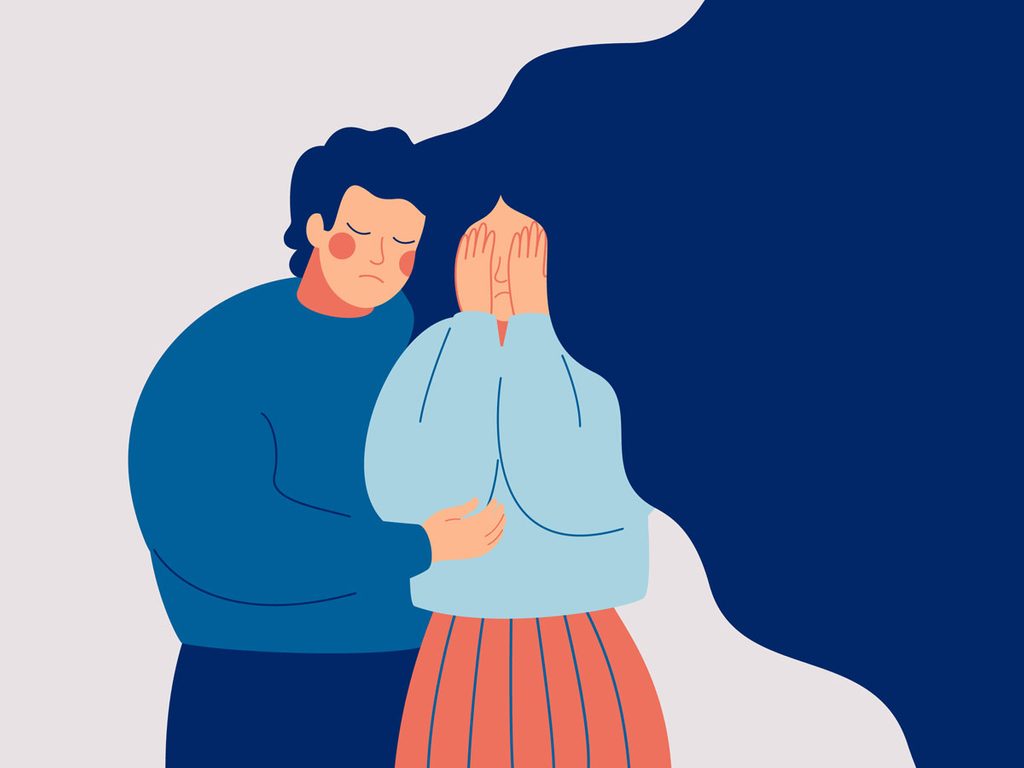How to Help a Loved One Who’s Struggling With Depression

Two experts share tips for helping a friend or family member who's struggling with their mental health.
Over the past few years, we’ve come a long way in creating awareness and removing the stigma associated with mental illness. Though there’s still a great deal of work to be done, it’s become easier to talk about mental illness and reach out for help. If friends or loved ones tell you that they’re struggling with their mental health, it’s best to be prepared with advice that validates their feelings, encourage them to get the help they need and let them know they can count on your support during rough times.
Elizabeth says…
I’ve had a lifelong battle with my mental health. While I’m blessed with a great support system, there are times when I’ve struggled with feeling like a burden. I know that it can be both difficult and frustrating to support a friend or family member who struggles with depression, but the right approach can make all the difference. Over the years, I’ve learned which supportive gestures work best and might help you support a loved one who’s struggling with depression.
- You don’t have to solve the problem. Just be there with an open, empathetic ear and remind your friend that you’re there to listen when she needs to talk.
- Checking in with a phone call or text message to remind your friend that you’re thinking of her can make her feel supported and less alone.
- Invite your friend out. It can be difficult for someone to mobilize in the throes of a deep depression and she’ll probably refuse time and time again. But one of these days, she’ll say yes and be appreciative of your company and persistence.
- When someone struggles with depression, it doesn’t mean that she is in a constant state of misery. There are better and worse moments. If you see your friend smiling or laughing at a joke, it doesn’t mean that she is all better, and comments that suggest this create pressure. Just appreciate those moments of levity with her and look forward to when they overtake the tearful ones.
(Psst: Here’s what you never say to someone struggling with depression.)
Lisa says…
I see many clients who live with depression in my psychotherapy practice and know firsthand that having a support system can make a huge difference in the recovery process. There are many ways to help a friend who is struggling with depression, but it’s important that you don’t sacrifice your own mental health in the process. Be a caring, empathetic and supportive friend, but be good to yourself, too.
- Encourage your friend to find a therapist. While she might feel that venting to you is enough, she’ll benefit from the objective and unbiased approach of a trained professional. Therapy will also allow her to develop strengths and learn new skills that will help her deal with challenges. (Note: These are the signs that the therapist you’re seeing is not a good fit.)
- It’s important to acknowledge that mental illness is a legitimate disease with physical and emotional symptoms. Your friend might feel exhausted and experience muscle aches, headaches and stomach pain. As with any other illness, it takes time and support to heal. Be patient as your friend goes through the process – it doesn’t get better overnight.
- Be an advocate for erasing the stigma associated with mental illness. Participate in initiatives like Bell Let’s Talk. Your involvement lets your friend know you care and helps thousands of people who struggle in silence.
- Take care of yourself. Helping a loved one who struggles with mental illness can be stressful. Talk about what you’re feeling and build your own support system.
Together, Elizabeth Wiener and Lisa Brookman form WiseWomenCanada.com. Follow them on Instagram at @wisewomencanada.
Next, check out the one thing Elizabeth and Lisa suggest doing after a breakup.




